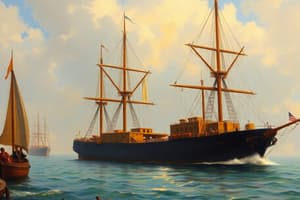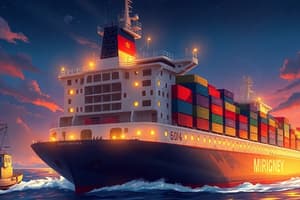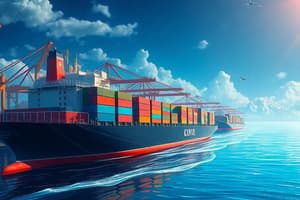Podcast
Questions and Answers
What is the role of a ship owner when it comes to cargo in transit?
What is the role of a ship owner when it comes to cargo in transit?
A ship owner bears the risk of loss or damage to cargo in transit.
What is the definition of a charterer?
What is the definition of a charterer?
A charterer is an entity that hires a ship to carry its cargo on a specific voyage or series of voyages at a fixed price.
Which of the following expenses are borne by the shipowner? (Select all that apply)
Which of the following expenses are borne by the shipowner? (Select all that apply)
- Capital (correct)
- Wages (correct)
- Port Dues and Bunker (correct)
- Supplies (correct)
- Loading and Discharging Costs (correct)
- Maintenance (correct)
What does a charterer pay for?
What does a charterer pay for?
A charterer always pays for the overtime of the crew related to cargo handling in port.
A charterer always pays for the overtime of the crew related to cargo handling in port.
Which INCO term implies that the charterer bears the expenses related to discharging and loading cargoes?
Which INCO term implies that the charterer bears the expenses related to discharging and loading cargoes?
A voyage charter party typically covers a single voyage.
A voyage charter party typically covers a single voyage.
Consecutive voyage charters involve contracts for multiple voyages with the same ship within a specified time.
Consecutive voyage charters involve contracts for multiple voyages with the same ship within a specified time.
What is the difference between a voyage charter and a time charter?
What is the difference between a voyage charter and a time charter?
Under a time charter, who is responsible for bunker and port charges?
Under a time charter, who is responsible for bunker and port charges?
Flashcards
Ship Owner
Ship Owner
The entity that owns and operates a vessel, responsible for its costs and potential cargo loss/damage.
Charter
Charter
The entity that hires a ship for a specific voyage or series of voyages, paying a fixed price.
Charter Rate
Charter Rate
Fixed price per unit (tonne) charged for shipping cargo.
Voyage Charter Party
Voyage Charter Party
Signup and view all the flashcards
Consecutive Voyage Charter
Consecutive Voyage Charter
Signup and view all the flashcards
Capital Costs
Capital Costs
Signup and view all the flashcards
Maintenance Costs
Maintenance Costs
Signup and view all the flashcards
Wages
Wages
Signup and view all the flashcards
Supplies
Supplies
Signup and view all the flashcards
Loading/Discharging Costs
Loading/Discharging Costs
Signup and view all the flashcards
Port Dues
Port Dues
Signup and view all the flashcards
Bunker
Bunker
Signup and view all the flashcards
Freight
Freight
Signup and view all the flashcards
Demurrage
Demurrage
Signup and view all the flashcards
Dead Freight
Dead Freight
Signup and view all the flashcards
Time Charter
Time Charter
Signup and view all the flashcards
Study Notes
Expenses Borne by the Shipowner and Charterer for Consecutive Voyages
-
Shipowner: The entity owning the vessel (ship) and responsible for its operation. They bear the risk of cargo loss/damage in transit.
-
Charterer: The entity hiring the ship for a specific voyage or series of voyages at a fixed price (charter rate) per unit (tonne) shipped.
Expenses Borne by the Owner
- Capital costs
- Maintenance costs
- Wages
- Supplies
- Loading and discharging costs
- Port dues
- Bunker fuel
Charterer Responsibilities
- Pays the freight
- May sometimes bear expenses for crew overtime related to cargo handling in port.
- If the charter agreement includes "free in/out"(FIO), they bear costs related to loading/discharging cargo at specific ports.
Charter Parties for Consecutive Voyages
- A special type of charter where a vessel is contracted for multiple consecutive voyages.
- The charterer and shipowner agree on a period, often a year, for several voyages.
- The shipowner provides the ship to perform loading, discharging and transporting goods to ports specified by the charterer.
Types of Charter
- Voyage Charter: Covers one or two loading and discharging ports.
- Involves freight costs, demurrage, bunker charges, port charges (all related to the vessel)
- Cargo-related charges are the responsibility of the charterer, specified as "A/C".
- Time Charter: Used for time periods. The vessel is at the charterer's disposal.
- Involves monthly advances, charter hire(payments), bunker and port charges (associated with the vessel), and cargo related charges (responsibility of the charterer, written as "A/C".)
Studying That Suits You
Use AI to generate personalized quizzes and flashcards to suit your learning preferences.
Description
This quiz explores the financial aspects associated with shipowners and charterers during consecutive voyages. It delves into the various expenses borne by each party and the implications of charter agreements. Test your understanding of the dynamics between ship operation costs and charterer responsibilities.




